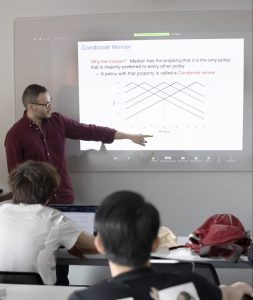Please note: This course will be taught in hybrid mode. Hybrid delivery of courses will include synchronous live sessions during which on campus and online students will be taught simultaneously.

Sergio Ascencio is a Lecturer in the Department of Government at the University of Essex. His research uses formal theory and quantitative methods to study political institutions, electoral competition, gender and politics, and party strategy in developing countries, with a focus on Latin America. He holds a Ph.D. in Political Science from the University of Rochester. Before joining the University of Essex, he was a tenure-track assistant professor at the University of New Mexico and a postdoctoral associate at New York University Abu Dhabi.
Course Content
In many social interactions, individual welfare depends on the actions of multiple actors. Therefore, individuals must anticipate how others will behave in order to make the best possible decisions. Game theory provides a framework for understanding and analyzing such strategic interactions. The goal of this course is to introduce students to the fundamentals of game theory and to guide them through some important applications of it, with special emphasis on political science topics. We will cover basic solution concepts for simultaneous and sequential move games, with and without complete information. Applications will be drawn from models of electoral competition, conflict and war, legislative politics, and others.
Course Objectives
The main objective of this course is to prepare students to be effective “consumers” of research that employs game theory. Participants will be able to understand and analyze game-theoretic models used for studying and explaining phenomena across multiple fields, including political science, economics, and business. Students will acquire working knowledge of games, particularly games of complete information; by the end of the course they will be able to write down and solve simple models. Finally, in addition to enhancing participants’ current technical and analytical skills, this course serves as a foundation for those who are interested in taking more advanced courses and in using game theory in their own research.
Course Prerequisites
There are no formal prerequisites. However, participants are assumed to have some familiarity with elementary mathematical concepts (e.g., sets, functions, elementary probability theory).
The material presents similar challenges as mathematics generally. Therefore, willingness to work with special notation, study abstract concepts, and use rigorous/logical thinking are essential. The course does not require knowledge of calculus.
Background reading:
Martin J. Osborne, Introduction to Game Theory, Oxford University Press, ISBN: 9780195128956 (this book will be provided by ESS)



